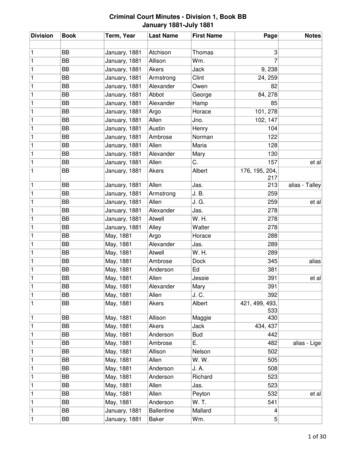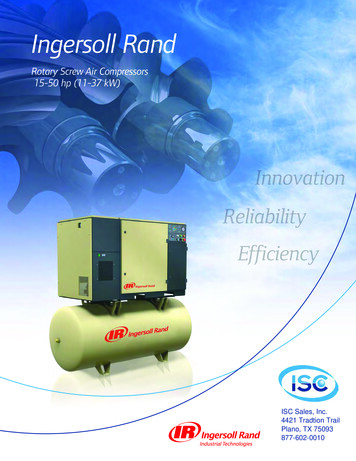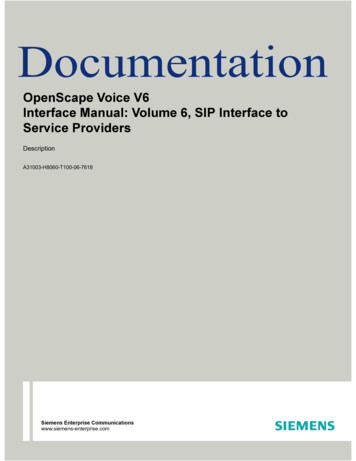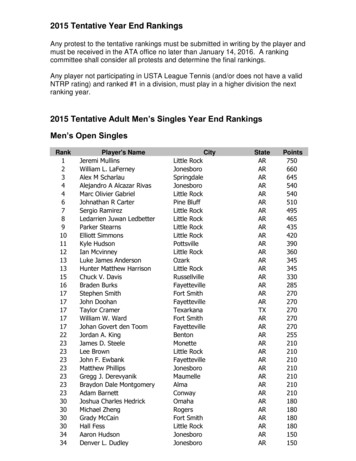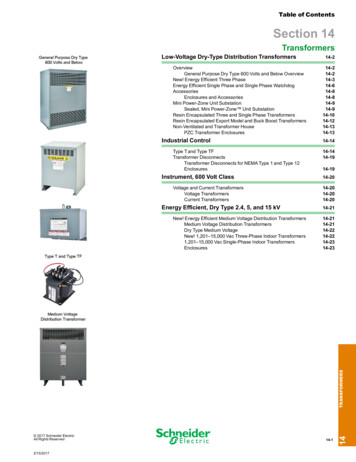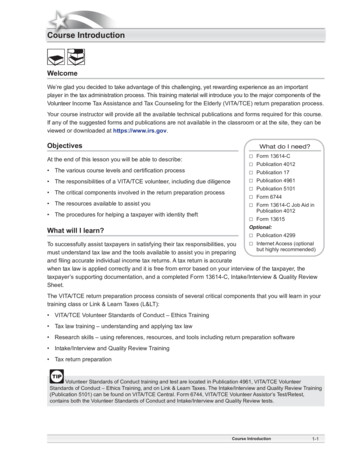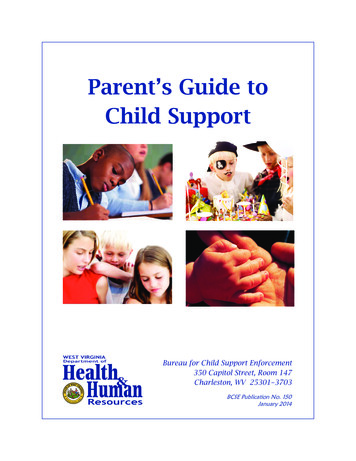
Transcription
BCSE Publication No. 150January 2014
IMPORTANT INFORMATION FOR YOUR RECORDSFill in the blanks below in pencil and keep the information up-to-date for the life of your casewith the Bureau for Child Support Enforcement.Your BCSE Case #:Your BCSE Personal Identification Number (PIN):(Telephone Information System)The Other Parent’s Information:Address:Social Security Number:Place of Birth:Employer:Parents’ Names:Dates of Birth:Notes:i
CONTENTSContents . iiDo You Have the Facts about Child Support .iiiWhy You Need This Handbook . 1Definitions of Child Support Terms. 2About the West Virginia Bureau for Child Support Enforcement . 5General Information . 5Your Rights and Responsibilities . 7The West Virginia Court System . 9You and the Family Court Judge . 9Paternity Establishment. 10Paying Child Support. 13Important Basic Information . 13Events or Circumstances That May Affect Child Support . 15Mistakes in Your Case . 18What Happens If You Do Not Pay Your Child Support . 19Receiving Child Support . 21The Amnesty Program . 22Tips to Help the BCSE Help You . 23Telephone Numbers and General Information . 24BCSE County Offices (Addresses, Telephone and Fax Numbers) . 25 thru 30NOTICE: Laws governing child support and paternity may be changed by the Legislature or maybe interpreted in different ways by the Court. This booklet provides the most current informationavailable and can help you to identify issues that may exist in your case. It is not possible topredict all of the events in any individual case, so the information here should be viewed as generalinformation.THIS BOOKLET IS NOT INTENDED TO BE LEGAL ADVICE. YOU SHOULD NOT RELYSOLELY UPON THIS BOOKLET IN MAKING DECISIONS WHICH WILL AFFECT YOUR LEGALRIGHTS. THE BUREAU FOR CHILD SUPPORT ENFORCEMENT DOES NOT REPRESENTYOU OR THE OTHER PARTY(IES) IN YOUR CASE. YOU MAY CONTACT YOUR OWNATTORNEY OR OTHER SOURCES OF INFORMATION IN MAKING DECISIONS REGARDINGYOUR OWN CASE. YOU MAY EXAMINE STATE AND FEDERAL LAWS AND LEGISLATIVERULES AND OTHER SOURCES OF LEGAL INFORMATION GOVERNING CHILD SUPPORTAND PATERNITY.ii
DO YOU HAVE ALL THE FACTS ABOUT CHILD SUPPORT?xWhere is the Bureau for Child Support Enforcement (BCSE) located and howcan it be contacted?See Pages 25 through 30 of this handbook for local office listings.xHow can you get current information about your case 24 hours a day, sevendays a week?See Pages 5 & 6.xWhat is the easiest way to solve a problem with the BCSE?See Page 6.xWho is responsible for deciding custody and visitation?See Page 9.xWhat should you bring to a paternity hearing?See Page 12.xHow is your child support calculated?See Page 13. How do you make child support payments?See Pages 13 & 14. How will you receive your child support payments?See Page 21. How long do you have to pay child support?See Page 14. Does extra money you give the other parent count toward child support?See Page 15. What if you lose your job?See Page 15. What should you do if you think there is a mistake in your child support case?See Pages 18 & 19. What will happen if you do not pay child support as ordered?See Pages 19 & 20.iii
WHY YOU NEED THIS HANDBOOKYou are reading this handbook because a marriage in which you had childrenended, you are separated, or you had a child out-of-wedlock. Even if you are not a spousenor have ever been one, if you have a child, you will always be a parent. Children havea legal right to financial support from both parents. They do not lose this right if theirparents divorce, separate, or were never married.The child support system protects a child’s right to financial support from bothparents. Several groups with different duties make up this system: Federal and Stategovernment, courts, law enforcement agencies, child support enforcement agencies,employers, hospitals, and YOU.It is the duty of the West Virginia Bureau for Child Support Enforcement (BCSE) tomake sure that child support orders are obeyed. The BCSE’s job is to ensure that childrenreceive all the financial support to which they are entitled.As an obligor, you play a big role in the child support system. This handbook is yourguide to becoming an active and informed parent. It explains BCSE services, steps thatmust be followed in working your case, and what you can do to correct problems whenthey do arise.Regular financial support is important to children. One of the BCSE’s goals is towork with you. It is much easier for everyone if you pay your support as ordered and tellthe BCSE when you change jobs and your address.Please read this handbook and keep it with your important papers. Call or write yourlocal BCSE office for information about your case. These offices and telephone numbersare listed at the end of this booklet.1
DEFINITIONS OF CHILD SUPPORT TERMSAdministrative (Fair) A formal meeting at the local DHHR office to determine if the BCSEHearinghas applied proper procedures in dealing with a case. A specialhearing officer will make the decision.AdministrativeModification ofChild SupportAny party seeking modification of a child support order due to asubstantial change in circumstances may request the help of theBCSE. The BCSE will assess, prepare, and present anappropriate Petition for Modification and Proposed Order to theFamily Court if the case qualifies for a modification.AffidavitA written statement of facts which is sworn to be the truth. Thestatement may be prepared in advance, but you must sign it infront of a notary public. The notary will also sign to show that youswore that the statement was true and that the notary witnessedyour signature.ArrearageUnpaid child support, including interest, for past payment periodsowed by a parent who is obligated to pay.CaretakerPerson with legal custody and with whom the child lives. This maybe a parent, other relative, or someone else. See Custodial Parentand Obligee.Child SupportGuidelinesA standard method for setting the amount of child supportobligation based on the income of both parents and other factorsas determined by State law.Criminal NonSupportNon-custodial parents who willfully refuse to pay court-orderedchild support can be charged with a felony and prosecuted. Thecase must meet established criteria, and the decision to prosecuteis made by the County Prosecutor or the U.S. Attorney.Custodial ParentPerson with legal custody and with whom the child lives. This maybe a parent, other relative, or someone else. See Caretaker andObligee.CustodyLegal decision by a court that establishes with whom the child willlive (allocation of parental rights and responsibilities); the decisionis put in writing in a court order.Default JudgmentJudgment rendered when a party to a legal action fails to appear incourt after proper notification of a scheduled proceeding.Delinquent SupportSee arrearage.EmancipationIndependent status granted a child who is no longer a minor, ismarried, or has otherwise been determined to be independent ofhis or her parents.EnforcementEfforts taken to see that court ordered support is paid.2
Financial InstitutionWithholdingProcedure a non-custodial parent can use to have child supportpayments deducted directly from his/her bank account, This isoften used in cases where the non-custodial parent is selfemployed.Genetic TestingAnalysis of blood, tissue, or DNA of the mother, child, and allegedfather to determine a child’s biological father.Income WithholdingLegal procedure by which an employer or other source of incomeautomatically deducts support payments from the obligor’s income.InterestAdditional charge you must pay on court ordered child supportwhich has not been paid when due.JurisdictionLegal authority a court has over particular persons or certain typesof cases in a defined geographical area.Legal FatherMan recognized by law as a child’s male parent.LienLegal claim placed upon property to prevent sale or transfer until adebt is satisfied.Medical SupportMoney paid in accordance with a court order to provide medicalinsurance for a child or as payment(s) toward the child’s unpaidmedical bills.Modification ReviewA review conducted by BCSE to determine whether a change inthe amount of child support is warranted.Non-CustodialParentParent who does not have primary custody of a child but who isresponsible for a share of the financial support. See Obligor.ObligeeParent receiving child support payments. See Caretaker andCustodial Parent.ObligorParent obligated to pay child support. See Non-Custodial Parent.PaternityEstablishmentProcess to determine a child’s legal father.Pro seAn action by a party on his or her own behalf without theassistance of a licensed attorney; it may involve filing papers withthe court or appearing at a hearing.Support OrderAn order for a parent to pay a specific amount of money on aspecific schedule to the BCSE in support of minor child(ren).TANF (TemporaryAssistance toNeedy Families)Public assistance payments for children deprived of the financialsupport of one (or both) parent(s) due to death, disability, orcontinued absence from the home. (Previously called Aid toFamilies with Dependent Children - AFDC)3
UIFSA (UniformInterstate FamilySupport Act)A Federal law that provides a mechanism for establishing,enforcing, and modifying support orders, in addition to establishingpaternity, when parents live in different states or countries.4
QUESTIONS AND ANSWERSInformation AboutThe Bureau for Child Support Enforcement (BCSE)Question:What services are available through the BCSE?Answer:x Establishment of paternity in cases of out-of-wedlock birth;x Establishment of child support and medical support orders;x Collection and distribution of child support;x Enforcement of child support orders;x Location of the obligors and their assets;x Review and modification of child support orders;x Collection and distribution of alimony.Please call your local office to discuss the services available.Question:What services are NOT available through the BCSE?Answer:xxxEnforcement of custody or visitation.Retrieval of papers for your case such as birth certificates, divorcedecrees, tax returns, or other documents. (THIS IS YOURRESPONSIBILITY.)Abuse or neglect issues. (These are handled by DHHR’s Child ProtectiveServices.)Question:Who can apply for BCSE services?Answer:Either parent or the person with whom the child is living.Question:Whom do I contact if I have a question about my case?Answer:xWrite or call your local BCSE office. Be sure to put your name,address, and case number on any letters or notes. Have your casenumber ready if you decide to call instead of writing.5
xYou may also call the central BCSE Customer Service Unit’s toll-freenumber, 1-800-249-3778 or 304-558-4665 in Kanawha County. This willconnect you with the BCSE’s 24-hour Automated Telephone InformationSystem. This system gives you general information about child supportservices and lets you get specific payment information about your case.To get your payment information, you must use your PersonalIdentification Number (PIN) number. If you do not have a PIN number or ifyou have lost it, you may request one by contacting the Customer ServiceUnit Hotline at the numbers listed above Monday through Friday between8:30 a.m. and 5:00 p.m.Question:What should I do if I am having a problem with the BCSE?Answer:Please try to resolve the issue with your local BCSE office first by writingor talking to the Supervisor or Regional Administrative Manager. If this doesnot resolve your problem, call the BCSE Customer Service Unit at 1-800249-3778 (304-558-4665 in Kanawha County) or to the Customer ServiceUnit at 350 Capitol Street, Room 147, Charleston, WV 25301-3703.Question:Can I send my change of address in with my child support payment:Answer:No. You need to call or write your local BCSE Office, or contact theCustomer Service Unit Hotline at 1-800-249-3778 (558-4665 in KanawhaCounty) or write to the Customer Service Unit, 350 Capitol Street, Room 147,Charleston, West Virginia 25301-3703. You may also email the CustomerService Unit at DHHR-BCSEcsu@wv.gov.Please include your case Identification number and the obligee’s name.Question:Is my case information confidential?Answer:Yes. We cannot release your information to the other parent or to anyoneelse without a signed release from you. Your local BCSE office has forms forthis purpose. If you submit a signed form to release information, you mustspecifically name the person or organization to whom BCSE may release theinformation. The Release of Information Authorization Form remains valid.Information may also be requested through the court. The court will decidewhether the requested information should be released or withheld. In casesinvolving domestic violence, additional confidentiality laws will apply.Confidentiality laws protect your right to privacy.6
Question:If I do not know the location of my child or the obligee of my childrefuses to let me know the location of my child, will the BCSE let mehave the address?Answer:No. The BCSE cannot release this information unless the person who hasthe child gives written permission allowing his/her address to be released toyou, your attorney, or any person you designate. However, the court canorder the BCSE to release this information or to keep it confidential. Again, incases involving domestic violence additional confidentiality laws apply.YOUR RIGHTS AND RESPONSIBILITIESQuestion:As the obligor, what are my rights?Answer:xxxxxxThe right to be notified of any formal action being taken against you;The right to privacy of all information about your case, unless you agreein writing to allow the BCSE to release information to a specific person orunless a court orders the release of information;The right to a review of your child support order for a possible change inthe child support amount;The right to request a child support payment history;The right to fair, impartial, and courteous treatment;The right to request an administrative fair hearing.Fair Hearings: If you are receiving services from the BCSE and are not satisfied with theway your case is being handled, you have the right to request a fair hearing. Anadministrative fair hearing is a proceeding held by the WV Department of Health andHuman Resources to appeal actions taken or not taken in your case. This proceedingallows you to ask for an impartial review of the way the BCSE has handled your case. Torequest a Fair Hearing, contact your county office of the WV Department of Health andHuman Resources or the Bureau for Child Support Enforcement.Question:As the obligor, what are my duties?Answer: To pay your child support regularly as ordered by the court; To maintain health insurance for your child if ordered by the court; To maintain a current address and telephone number with the BCSE.(The BCSE cannot notify you of actions on your case unless it has yourcurrent address.);7
To inform the BCSE when you change employers and give youremployer’s name and complete address.It is in your best interest to notify the BCSE of changes such as these:x Your child reaches 18 years of age;x Your child is adopted;x Your child graduates from (or no longer attends) high school;x Your child marries before reaching 18 years of age;x Your child no longer lives with the other parent;x Your child is incarcerated;x Your child moves in with you;x Your child dies;x You and the other parent begin or resume living together;x The other parent is incarcerated;x The other parent dies;x The child moves in with someone other than his/her biological or adoptiveparents.The BCSE uses a computer system to track child support. Withoutinformation from you and the obligee, the BCSE and the courts have no wayof knowing that support should be changed or stopped in your case.Question:If I go to court and my support is lowered but it takes several monthsfor the court order to be entered, will the BCSE refund the overpaymentto me?Answer:If the money was owed to the State, it will be sent back to you. If theBCSE still has the money in its possession, it will be refunded to you.However, if the money was owed to the person who had the child and it wasalready sent to him/her, you will have to get the money back yourself. Tokeep this from happening, you can ask the court for a temporary order. Thisorder would immediately change the amount of the money you owe. TheBCSE could then tell your employer to reduce the amount of money beingsent to the BCSE. This would keep you from paying too much money.Question:Do I have to have an attorney to get my court order changed?Answer:No. You have the right to file a motion with the court and to representyourself. This is known as a pro se motion. Before filing, check your localcourt’s policies and procedures regarding pro se motions. You may hire anattorney to represent you. You may also ask the BCSE to review your caseto determine if it qualifies for an administrative modification.8
Question:If my order has already been entered, can I take/mail a copy to theBCSE?Answer:Yes. (Note: Always be sure to keep copies of any documents sent to theBCSE.)THE WEST VIRGINIA COURT SYSTEMFamily Court JudgesIn West Virginia, the court system decides what is in the best interest of the child andapplies the laws regarding child support. Family Court Judges are located throughout WestVirginia and are elected to eight-year terms. Family Court Judges hear the following typesof domestic cases: Divorce proceedings; Actions to establish child support, including medical support; Actions to establish paternity; Motions for child support, spousal support, child custody, and visitation; Motions to modify an order for child custody or visitation, child support,spousal support, or support for children over the age of 18; Objections to income withholding; Actions to establish and enforce interstate support; Actions to enforce support, custody, or visitation orders; Civil contempt actions. Domestic violence actions.The BCSE or a private attorney may file a petition seeking an order to establish or collectchild support. A Family Court Judge will conduct a hearing in the case and will send a copyof the order to each parent. The order will inform the parties how to file an appeal if theyobject to the Family Court Judge’s ruling.9
PATERNITY ESTABLISHMENTQuestion:What is paternity?Answer:Paternity means legal fatherhood. It means a man has been determinedto be the legal father of a child.Question:How can paternity be legally established?Answer:Paternity can be established for a child in one of three ways: Marriage - If the couple is legally married when the wife becomespregnant or if they are married at the time that the child is born, thehusband’s name will be placed on the birth certificate as the legal fatherunless a court rules otherwise. By a Voluntary Acknowledgment of Paternity - A Declaration ofPaternity Affidavit is a notarized form signed by both a man and awoman, stating the man is the father of the child. Signing theDeclaration of Paternity Affidavit legally establishes a man as the fatherof the child for all purposes. If the mother was married to another man atthe time the child was conceived or born, this method of establishingpaternity can only be used if the mother, her husband, and the allegedfather sign the Declaration of Paternity Affidavit acknowledging that thehusband is not the biological father and that the alleged father is the truebiological father of the child. Furthermore, paternity can only beestablished in this way when the husband’s name does not appear onthe child’s birth certificate and all three parties have signed theDeclaration of Paternity Affidavit within one year of the child’s birth.Otherwise, in such instances only a court can establish another man asthe legal father of the child. By Court Order - The court will decide if the alleged father is the legalfather. If the alleged father denies paternity, the court will usually ordergenetic testing.Question:What if one parent does not want to sign the voluntary Declaration ofPaternity Affidavit?Answer:If one of the parents does not want to sign the Declaration of PaternityAffidavit, paternity will have to be established by court order. Either themother or the father can petition the court to legally establish paternity. The10
BCSE can assist with the establishment of paternity based on a request bythe mother, the father, or anyone else who is a legal custodian of the child.Question:If a West Virginia Declaration of Paternity Affidavit is signed, canpaternity later be contested or disputed?Answer:Within sixty (60) days after a Declaration of Paternity Affidavit is signed,either the mother or the father can file a written Complaint asking the court toset aside the Affidavit. However, if a hearing is scheduled in a case wherepaternity is an issue, the parties have sixty (60) days or until the date of thehearing, whichever comes first, to ask the court to set aside the Affidavit. Atany later time, the court can only set aside the Affidavit for reasons such asfraud, duress, or material mistake of fact. In instances when the accuracy ofthe Affidavit is questioned, a court may order genetic testing or accept otherevidence to determine whether the man whose name is on the Affidavit is thechild’s father.Question:Can a mother in another state allege that I am the father of a child?Answer:Yes. States have cooperative agreements which allow the mother toestablish paternity even if the man that is identified as the father lives in adifferent state.Question:Does signing a Declaration of Paternity Affidavit give the fathervisitation rights or custody of the child?Answer:No. The signing of a Declaration of Paternity Affidavit does not determinecustody or visitation, nor does it establish a child support payment. However,signing the Affidavit does provide a basis to establish both custody andsupport through a later court proceeding.Question:Will completing the Affidavit give the child the father’s last name?Answer:The Declaration of Paternity Affidavit allows the child’s last name to bechanged when the birth certificate is filed only if both the mother and fatheragree to change the child’s last name.Question:What if I do not understand the Declaration of Paternity Affidavit?Answer:If there is any part of the Declaration of Paternity Affidavit that you do notunderstand, including your rights and responsibilities, please ask for help.You may write, telephone, or visit the West Virginia Bureau for Child SupportEnforcement Office nearest you. The BCSE is not your attorney and does notrepresent you; therefore, you may prefer to seek legal advice from an11
attorney. You may call the West Virginia State Bar at (304) 558-2456 to bereferred to a lawyer in your area.Question:You have been served with a Paternity Complaint, and you have filedyour Answer with the court. What should you do when you receive aNotice of Hearing?Answer:You should attend the hearing. The Notice of Hearing tells you when andwhere the paternity hearing will be held. Attendance is required even if youdo not believe you are the father. If you have denied paternity, you mayrequest genetic testing in your written Answer to the court or at the time ofyour hearing. If you admit you are the father of the child or children, youshould bring the information listed below to the hearing: Federal Income Tax Returns for the past two years including allschedules. If you are self-employed, you must also bring all supportingdocumentation for your tax returns; W-2 Forms for the past two years; The last three pay-check stubs from your job;x Your parent or guardian if you are under 18 years of age.You are not required to hire a private attorney, but you may do so if you wish.You will be responsible for paying your private attorney.Question:What if I do not show up for the hearing?Answer:If you fail to appear after being legally notified, the court can enter a defaultjudgment. This could establish you as the legal father even if you are not thechild’s biological father.Question:What if there are doubts about who the father is?Answer:The Declaration of Paternity Affidavit should not be completed andsigned unless both parties who sign it believe the man is the biological fatherof the child. If there is any doubt, genetic tests should be requested.Question:What is genetic testing?Answer:Genetic testing happens when the mother, child, and the alleged father havecells from inside their cheeks collected on swabs and sent to a lab for testing.The test compares the genetic markers (DNA) of the child, mother, andalleged father to determine whether the man is the biological father. Thesetests are very accurate. They can determine with a high degree of certaintywhether the alleged father is the child’s biological father.12
Question:Who pays for the genetic tests?Answer:The BCSE pays for the testing. If you are found to be the child’s father, youmay be required to reimburse the BCSE for the genetic tests. The court willdetermine which party will pay for genetic testing.PAYING CHILD SUPPORTImportant Basic InformationQuestion:Who determines the amount of support I am ordered to pay?Answer:The Court.Question:How is the amount of child support calculated?Answer:Using a formula, established by law, the Court calculates the amountbased on information about your income, the other parent’s income, certainexpenses, and the number of dependents. You will receive a copy of theformula with support calculations after the hearing. The formula can be foundin the West Virginia Code, Sections 48-13-301 through 48-13-603.Question:Am I responsible for my child’s medical expenses?Answer:The Court will determine the ability of each parent to provide medical care. Ifyou have medical insurance available at a reasonable cost, the Court mayorder you to place the child on your insurance. The Court may also order youto pay a percentage of the cost for medical services not covered by theinsurance.Question:How do I pay my child support?Answer:You can make your child support payments in one of three ways:1. If you have an employer, the BCSE will issue an income withholdingnotice to your employer. Your employer will deduct support directly fromyour income and send it to the BCSE.2. The BCSE can issue a withholding to a variety of other sources of incomesuch as Workers’ Compensation, Unemployment Compensation,pensions or annuities, and to Social Security for certain benefits.13
3. If the court orders the BCSE not to issue an income withholding, you mustpay by mail or in person directly to the BCSE. The BCSE will acceptmoney orders and personal checks through the mail. When paying bymail, please be sure to include on the check or money order your caseidentification number, and the obligee’s name. All payments made by mailare to be addressed to:Bureau for Child Support EnforcementPost Office Box 247Charleston, West Virginia 25321You may also access Make a Support Payment at www.wvdhhr.org/bcse,to pay by credit card or e-check.Question:What is an arrearage?Answer:An arrearage is the amount of support which is not paid. Interestaccumulates each month on outstanding amount of unpaid support.Question:How long do I have to pay child support?Answer:In many cases, child support ends when your child reaches age 18, but it cancontinue past the age of 18 under the following circumstances: The court may continue support if the child is still attending high school onhis or her 18th birthday, particularly if the child shows substantial progresstoward graduation; If the child is disabled and still dependent, regardless of age, the courtmay continue child support until the child is able to fully support himself orherself; If your order was entered in another state, there may be different laws fordetermining the age when child support ends.Question:If neither of the circumstances described above exist (to extend childsupport), will the income withholding stop on my child’s 18th birthday?Answer:If you do not have any other children under the age of 18 and no arrearagesare due, the BCSE will stop the income withholding. You should contact theBCSE to ensure that this takes place. If an arrearage remains unpaid, theBCSE will continue to collect support until it has been paid in full.14
Question:What if I do things for my kids over and above what the court ordered?Answer:Child support is basic financial support. You may provide as much additionalsupport as you wish for your child
parents divorce, separate, or were never married. The child support system protects a child's right to financial support from both parents. Several groups with different duties make up this system: Federal and State government, courts, law enforcement agencies, child support enforcement agencies,

